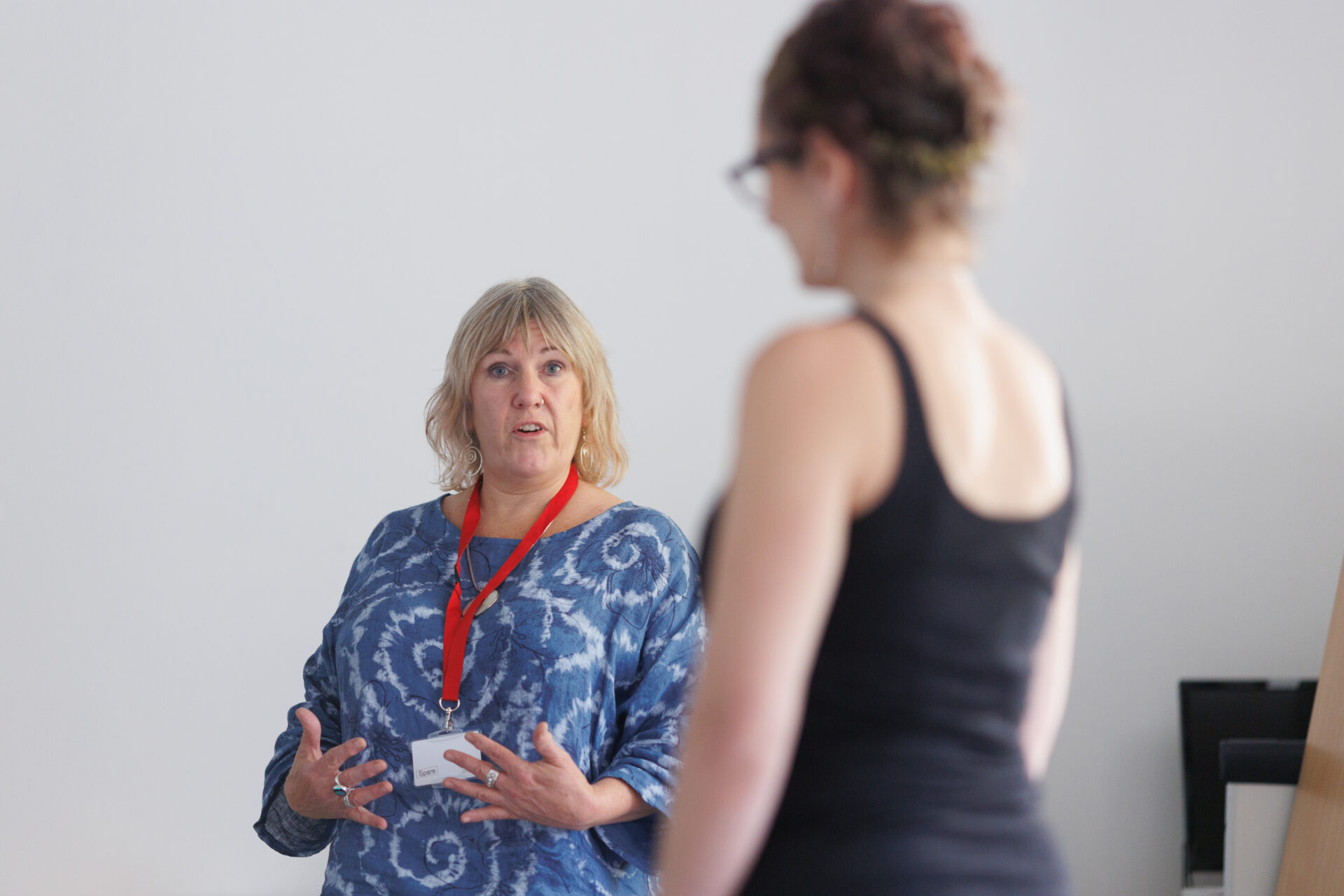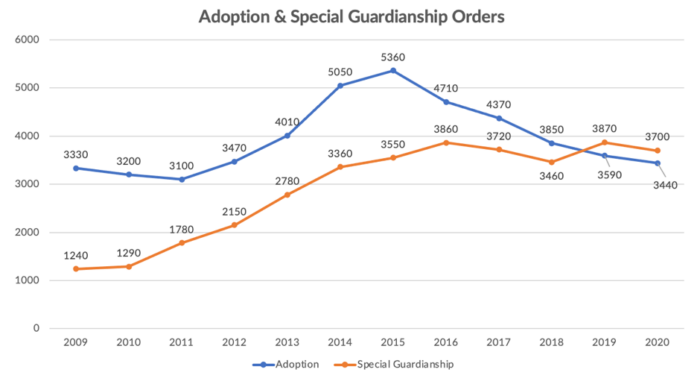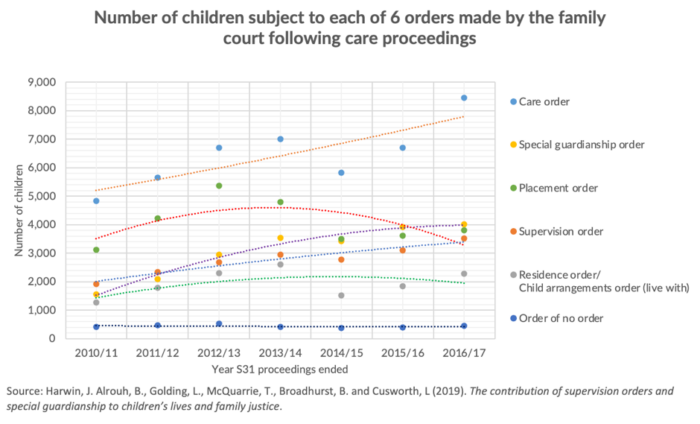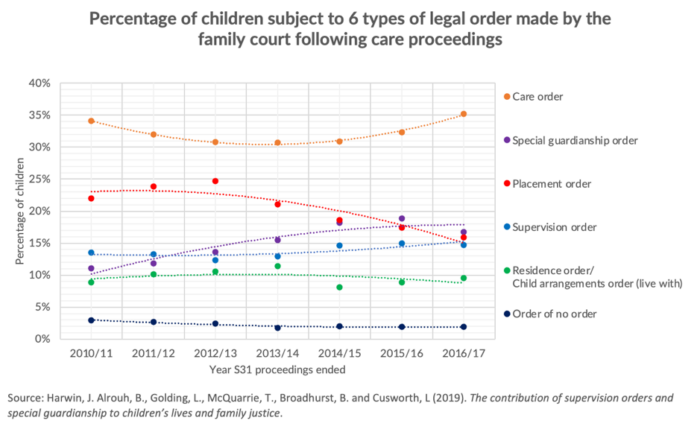
Join our professionals' network for social workers, academics and other professionals with an interest in kinship care.
For professionals:
Understanding the experiences of special guardians - a resource pack for professionals.
Please visit Support and advice for kinship carers

Click on the link below to take you to the section you'd like to read:
The information in this section results from research and an agenda for change in special guardianship orders (SGOs). It has been a co-production between Lancaster University, Kinship and CoramBAAF.
As part of this work, two films have been produced to allow us to better understand the experiences of special guardians themselves and the views of those who work in the sector.
This agenda is our joint responsibility to ensure that every child who enters the care system has access to a system that is focused on their safety, needs welfare and development.
In addition to the films, further resources have been produced that outline the legislative, policy and practice framework in England.
The first film ‘The First Day of Forever’ presents the views and personal experiences of 5 special guardians.
The second film ‘Special guardianship – an agenda for change’ includes the views of a range of professionals and sector leaders.
Special guardianship is regulated by the following acts and regulations:
The Children Act 1989 was amended by the Adoption and Children Act 2002 to establish special guardianship.
The following sections of the Children Act 1989 are relevant in setting out the legal definition of parental responsibility which is core to special guardianship.
The regulatory framework for special guardianship can be accessed at:
The Special Guardianship Regulations 2005
The Special Guardianship (Amendment) Regulations 2016
The Department for Education also provides Statutory Guidance on Special Guardianship.
A commissioned summary of relevant case law judgments has been prepared by Sir James Munby, former President of the Family Division (until July 2018) and Lucy Logan Green, Barrister, 4 Paper Buildings Chambers.
Trends in special guardianship orders granted (last updated in 2020)
Tracking trends in the use of special guardianship through national and local data is very important. It provides a barometer of practice by children’s services and the courts and can help inform policy. The Department for Education publishes an annual data set on the care system and this is supplemented by updates on specific issues from the now closed Adoption and Special Guardianship Leadership Board.
The most recent data from the Department for Education sets out the fall in the number of children leaving care through adoption orders and the rise in the number of children leaving care through a special guardianship order.

Source: click here
Cafcass data has been used by researchers at Lancaster University to compare the numbers and proportion of special guardianship orders with other types of legal order made following care proceedings between 2010/11 and 2016/17. This is a one-off national longitudinal survey.
Both DfE and Cafcass sources used by Lancaster University show that in recent years special guardianship has overtaken adoption as the more frequent permanency option for looked after children unable to remain with their birth parents.


Who are the special guardians?
The DfE collects annual data on children who cease to be looked after through a special guardianship order. For the year ending 31st March 2020:
No government statistics are available to provide a more detailed profile of special guardians including by type of relative, their ethnicity and age. This is a significant gap in our information.
The Special Guardianship Regulations 2005 sets out the duties and responsibilities of local authorities in the provision of special guardianship support services.
CoramBAAF have produced a series of slides summarising these regulations.
The Adoption and Special Guardianship Leadership Board (now closed) has produced an online resource Key elements of a special guardianship support service. This is hosted on the Kinship website.
Its aim is to capture the key elements of some of the most developed special guardianship support services currently available in England and to provide a benchmark against which service leaders can review and adjust resources and systems to make service improvements and achieve whole system change.
Read this guide, which aims to support the development of responsive and effective support services for children leaving care under a special guardianship order (SGO).
Read the guideSince 2016 special guardians have been eligible to apply to the adoption and special guardianship support fund (ASGSF) through the local authority responsible for providing support services.
The film highlights that it is a priority to increase uptake of the fund by special guardians.
Figures for the year ending December 2019 show that 9.4% of all approved applications to the ASGSF are awarded to children on special guardianship orders who were previously looked after.
The number of approved applications was 3,619 with an average funding of £3033.
See also:
Answer to a Parliamentary Question of use of the Adoption Support Fund
Do you know how to access the adoption and special guardianship support fund?
Local authorities and regional adoption agencies can apply for therapeutic funding for eligible adoptive, special guardianship order and child arrangement order families.
Kinship Connected is an evidence-based support programme for special guardians and other kinship carers delivered by Kinship in collaboration with local authorities. An external evaluation of the programme shows significant positive impacts for carers an evaluation of kinship care.
Kinship has published an economic case for the support of kinship care.
The average cost for a child in local authority foster care £533 per week or £27,716 per annum, based on Department for Education national data. See also:
Curtis, L. and Burns, A. (2019) Unit Costs of Health and Social Care 2019, Section 6.5 Foster care for children, Personal Social Services Research Unit, University of Kent.
Fostering in England, the review of the foster care system including its costs commissioned by the Department for Education and led by Martin Narey and Mark Owers (2018).
Holmes L., (2021) Children’s Social Care Cost Pressures and Variations in Unit Costs Research Report, Rees Centre, Oxford University.
The research publications we have listed draw below together key studies on special guardianship and kinship care and include findings from the international literature.
At the present time there are important gaps in our knowledge of children’s long-term outcomes following special guardianship, first-hand accounts of children’s experiences and research on contact when compared to adoption.
However there is increasing recognition of the importance of addressing these gaps in order to inform practice and policy. We have also included references to some of the major studies on poverty and deprivation as these socio-economic problems can have an important influence on child development and children’s life chances.
Brown, B, Broadhurst, K., Harwin, J. and Simmonds, J (2019) Special guardianship: international research on kinship care, Nuffield Family Justice Observatory
Cleaver H., Rose., W. (2021) Safeguarding Children living with Foster Carers, Adopters and Special Guardians: Learning from case reviews 2007–2019, CoramBAAF
Cleaver H., Rose., W. (2021) Safeguarding Children living with Foster Carers, Adopters and Special Guardians: A guide to reflective practice, CoramBAAF
Harwin, J, Alrouh, B., Golding, L., McQuarrie, T., Broadhurst, K., and Cusworth L. (2019) The contribution of supervision orders and special guardianship to children’s lives and family justice, final report, Lancaster University. .
Harwin, J., Simmonds, J., Broadhurst, K., and Brown, R (2019) Special guardianship: a review of the English research studies, Nuffield Family Justice Observatory.
Hunt J., (2020) Key findings from the last two decades of UK research on kinship care, Family Rights Group
Iyer, P., Boddy, J., Hammelsbeck, R., and Lynch-Huggins, S. (2020). Contact following placement in care, adoption or special guardianship: implications for children’s and young people’s wellbeing Evidence Review
Murray, E, Rebecca Lacey, Maughan, B., Sacker, A. 2020 Non-parental care in childhood and health up to 30 years later: ONS Longitudinal Study 1971–2011 [subscription only], European Journal of Public Health, Volume 30, Issue 6
Nuffield Family Justice Observatory (2020) Contact between children in care or adopted and their families: six key messages from research briefing paper is based on findings from three evidence reviews commissioned by the Nuffield FJO.
Simmonds, J., Harwin, J., Brown., R., and Broadhurst, K. (2019) Special Guardianship: a review of the evidence, summary report, Nuffield Family Justice Observatory.
Wade, J., Sinclair, I., Stuttard, T. and Simmonds, J.(2014) Investigating special guardianship.; experiences, challenges and outcomes, Department of Education
Wellard S., Meakings S., Farmer E., and Hunt J. (2017). Growing up in kinship care: Experiences as adolescents and outcomes in young adulthood. London: Kinship
Anda, R., Felitti, V., Bremner, J., Walker, J., Whitfield, C., Perry, B., Dube, S., Giles, W., (2006). The enduring effects of abuse and related adverse experiences in childhood. European Archives of Psychiatry and Clinical Neuroscience 256(3): 174–186.
Bywaters, P., Bunting, L., Davidson, G.,, Hanratty, J.,M Mason, W., & Mccartan, C. & Steils, N., (2016), The relationship between poverty, child abuse and neglect: an evidence review.
Featherstone, B., Morris K., Daniel, B., Bywaters, P., Brady, G., Bunting, L., Mason, W., Mirza, N., (2019), Poverty, inequality, child abuse and neglect: Changing the conversation across the UK in child protection? Children and youth services review, 97, pp.127–133.
Marmot, M., (2020), Health equity in England: the Marmot review 10 years on. Bmj, 368.
McCartan, Claire et al., 2018. Stripping the Wallpaper of Practice: Empowering Social Workers to Tackle Poverty. Social sciences (Basel), 7(10), p.193.
Morris, Kate et al., (2018). Social work, poverty, and child welfare interventions. Child & family social work, 23(3), pp.364–372.
Rose, W and McAuley, C. (2019) Poverty and its impact on parenting in the UK: Re-defining the critical nature of the relationship through examining lived experiences in times of austerity. Children and Youth Services Review; 97: 134-141.